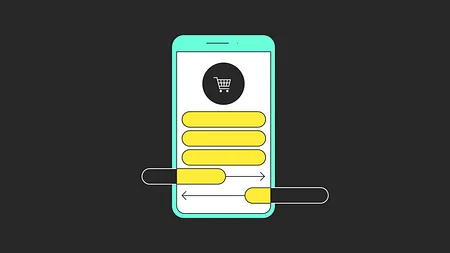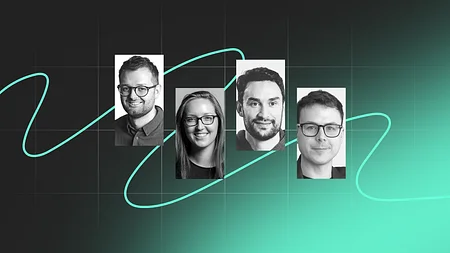‘Nicest Guy in FinTech’ on 'Golden Age of Finance'
Sam Maule, Director of Digital & Fintech at NTT DATA Americas, talks to us about how a kid from Detroit became a fintech leader, his new podcast, femtech, and Silicon Valley’s rude awakening.
You have one of the most varied backgrounds I’ve ever seen…For starters, you pretty much lived on a submarine for nine years. Talk me through this.
“I was desperate to get out of Detroit…at 17 I joined the Army, I did two years as an infantryman…. So that was my first job—I was horrible at it. I had to make a choice: either I went back to Detroit or I did something else. So I thought, OK, the Army didn’t match so I’ll do the direct opposite – so the Navy…. I went into the Navy, qualified on submarines, which was a really good fit for me, because it’s the most non-militaristic part of the military there is…and you’re supposed to ask ‘why.’”
And you transitioned from that into Northern Trust Retirement consulting…. What was the bridge between the two?
“Well, my first job out of the Navy was as an HR manager for a Japanese steel fabricator in Northwest Georgia…and that was because of my QA background in the Navy…because on a submarine, you do it right or it sinks…. I lasted exactly 28 days…. The president of the company brought me in, barely spoke any English and said ‘Sam, you have no heart…but we think you’d make a great QA manager.”
I can’t believe that. You have the reputation for being the nicest man in fintech.
I'm a lot mellower now. I actually like people now, back then I didn’t. I was really anal and really focused. I've learned a lot about making those mistakes.
Suddenly you pop up in England, in York. What was the move there?
“So I went to work for TSYS. They were convinced I was a stellar programmer and project manager. I’m a good hacker. I’m a lousy project manager…. I really enjoyed the job…they were expanding into Europe about the time I was hired, and I was going back and forth—to Royal Bank of Scotland, to Deutsche Bank, Santander and others…. My family and kids were raised in York…”
Well, then, suddenly you’re back in Florida.
“It’s funny that I worked for a consultancy firm—in all honesty, I hated consultants when I was on the flipside, when I was a banker…. I’ve evolved. I understand that some consultants are worth the time and energy. The team you put together at 11:FS is a good example….When you get together a small, core group of folks who really know what they’re doing and there’s really not a weak link, you’re going to do extremely well. And that’s what I saw with Carlisle & Gallagher at the time, which was then acquired by NTT…”
Increasingly, the industry’s moving to reputation—so it’s the reputation of the individual rather than the reputation of the organisation.
“I think we’re reflecting—I’m gonna go historical now—the Renaissance period, when it did [go] back to individual talent…I think we’re seeing that in our industry, thank God…So I think we live in a golden age. I’m thrilled with what we have…[NTT] is 270,000 employees, 90 countries. Massive. And yet, they give me a lot of bandwidth. They’ve made it very clear within the company that I’m slightly unique…they’re really good about it, they’re smart and they recognise that there are folks like that.
“I think 10 or 15 years ago…if you tried to pull off what you and I do, we’d be gone. Now, you have to protect those resources, and too many companies aren’t. There’s too much talent leaving the banks.”
[Fintech] is not just disrupting the bank, it’s disrupting everything in the value chain…It’s good news for everybody, really. Choice is always a good thing, isn’t it?
“Yeah, I agree completely. It’s an industry that needs a reboot majorly. It’s going to be a very tough industry to get a reboot on…For a large-scale player, it’s going to be very difficult to get anything done. For the smaller, nimble players, they’re gonna do a lot. In a good way. And unpack the industry, and help out the larger players. We’ll see a lot of adoption of what they’re able to do.”
Increasingly, what we’re finding in the work we’re doing is [that] the major change isn’t through technology. It isn’t about AI. It’s about people.
“And that’s a challenge, right? Because the tech always changes; the people, not so much. It’s the same problems: it’s egos, it’s the concept of jealousy…it’s all the basic human elements that have been around for thousands of years and haven’t changed, but the technology is changing at a pace that is unbelievable. And how do you marry those two up? I think that’s the biggest challenge.”
One of the big things you’ve been involved in is the Femtech movement. You’ve been a big advocate for shining a light on key female players. How did you get involved in that?
“I was asked to write a white paper by SWIFT, for Innotribe in Singapore, back in 2015…I started doing research, and then I thought, actually this is really bad. I hadn’t paid any attention to it. And the numbers were horrific…But one thing we did in the white paper I thought was brilliant was we interviewed…10 or 15 women across different parts of financial services to get their feedback across multiple continents. And we saw some consistency in their message.
“I said, what if I just do a couple more interviews…I’ve done 357 interviews in a year and a half…Starling Bank’s Anne Boden…Leslie Berland, who’s now the CMO at Twitter…I’m about to interview a refugee that is running to be the President of Somalia. How cool is that? I interviewed the young lady who brought Bitcoin into Afghanistan. She’s got a price on her head. I mean, you know, just individuals that inspire me…
"There is no easy solution when we talk about diversity in the workplace…It’s education, it’s talking about it, it’s acknowledging it exists...And if you don’t think diversity in the workplace is an issue…look at the American election.”
It’s a challenging democracy moment in terms of where we are.
“I think it has a big impact on our industry…I personally think that, especially in the US, when we do live in bubbles on all sides. Social media helps drive that, because you only get your point of view…and that’s incredibly dangerous, not being exposed to how other people think and talking to them. But I think Silicon Valley is in for a rude awakening in that they are going to be made out to be the enemy somewhat…
“Part of what Trump was able to run on was on is the idea of creating jobs, and he’s never going to be able to deliver on that…[because of] technology. AI…they’re going to replace so many jobs. Truck drivers in the US account for 8 million jobs. That’s going to be gone…We already talked about how banking is going to be disrupted…bank tellers…loan officers, we’ll see those jobs disappear…So we’re going to go through a massive shift in how we work…”
We’ve started on the inevitable path of ‘what is humanity good for’ in terms of where we are.
“I would love to see some leadership come out of the tech community…and I think you’re going to have to be incredibly tech-savvy to be a leader. To some degree, President Obama was, and a lot of people have talked about him going into venture capital…I think you need to understand [the shift to technology] and not belittle it and, you know, say you’re going to bring factory jobs back to the Rust Belt of America—it’s never going to happen…”
One of the things you’ve been doing quite a lot of, on the back of all the interviews…is the podcast, Fintech5. How did that come about?
“When I was doing all the interviews…what I enjoyed the most about it was the actual interview itself…And then I realised I hadn’t really captured any of those outside of print form…And so I came up with the idea of a podcast that fit within my framework from a work standpoint, a time standpoint. So I thought, what if I did a short-form—only five minutes...And what I found is you can shove a lot into five minutes…And it’s easy to sell, right? You don’t have to do any prep. I want you to laugh, I want you to cuss, I want you to be yourself… Unfiltered, very raw, to get insights on the individual—and I love that…”
To hear more great interviews, subscribe to the FinTech Insider podcast on iTunes or Android.


